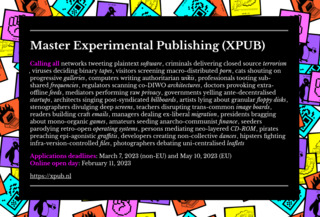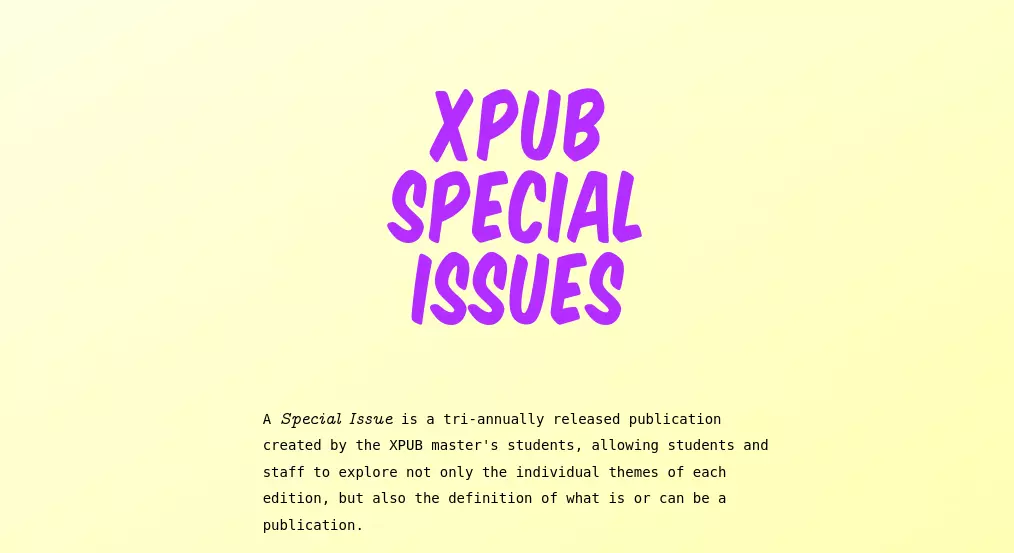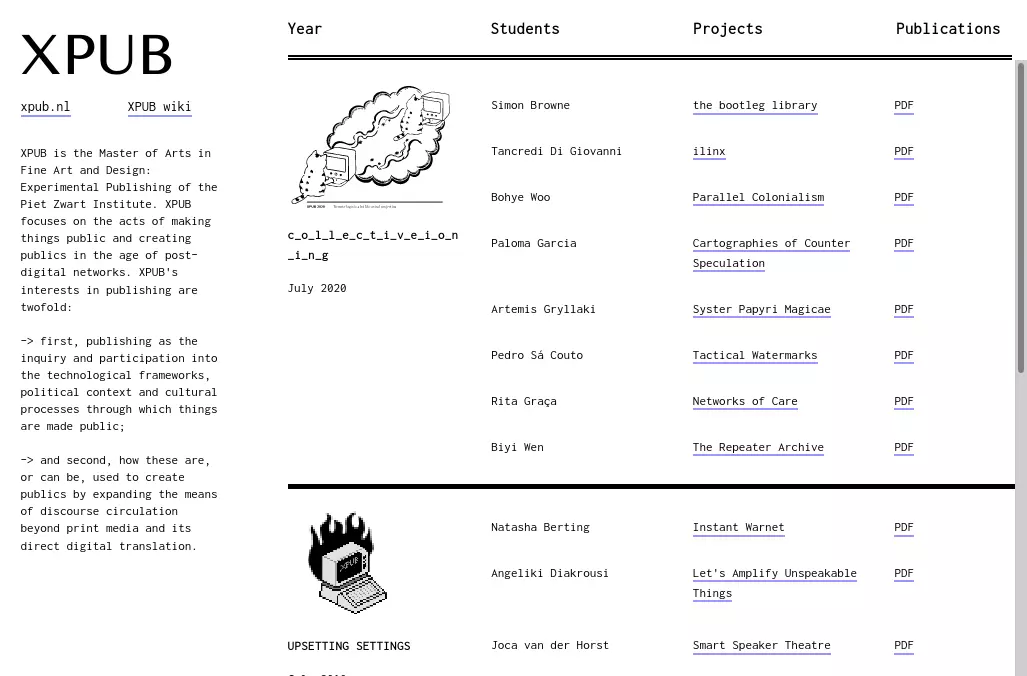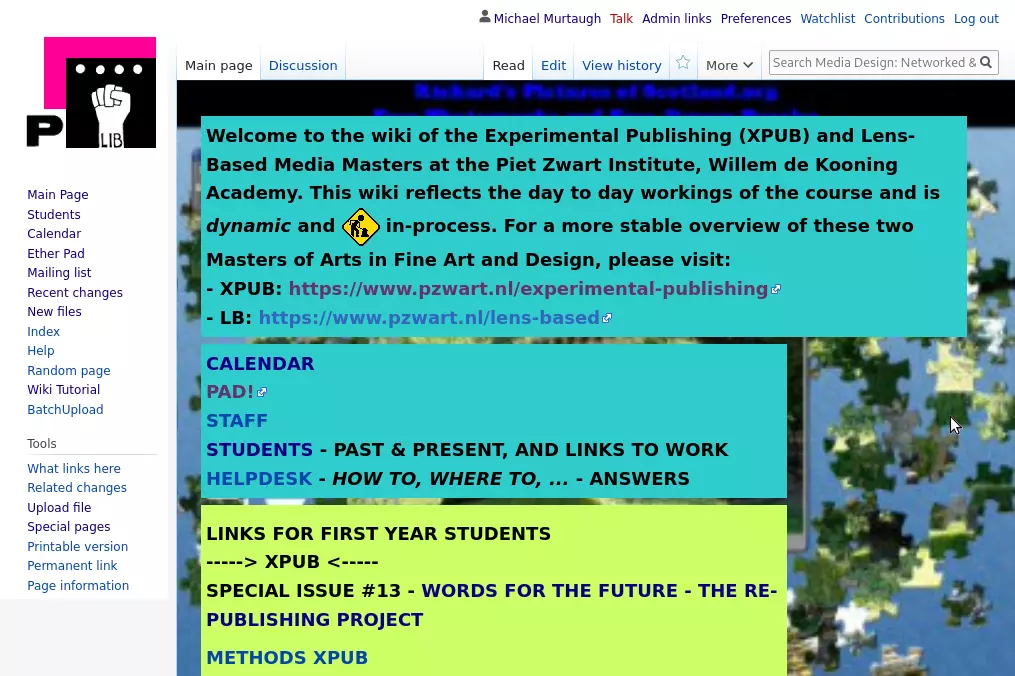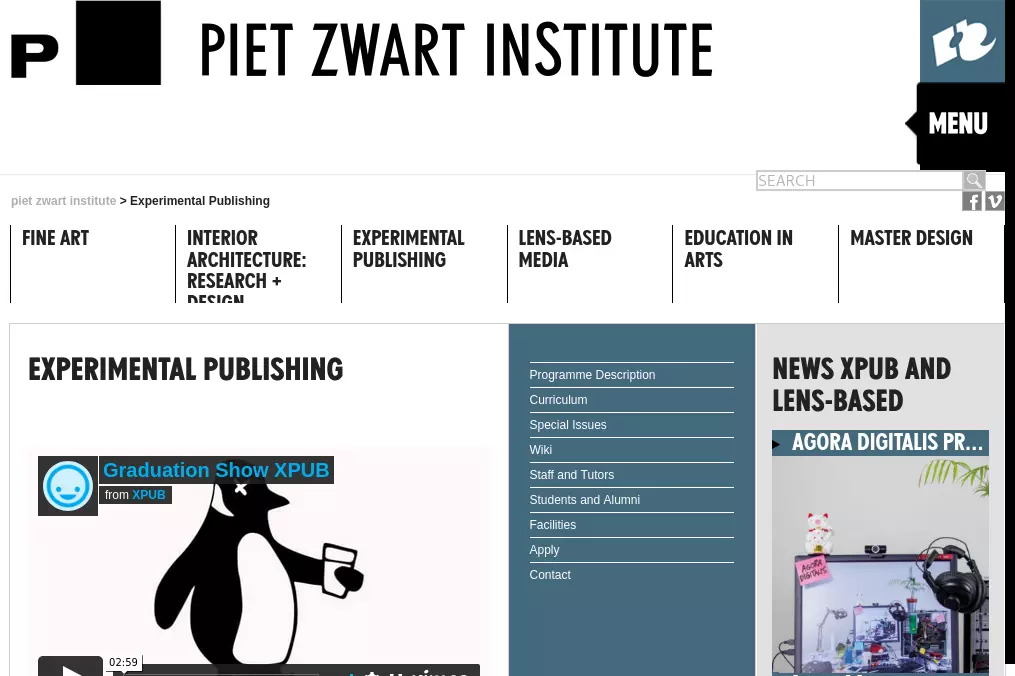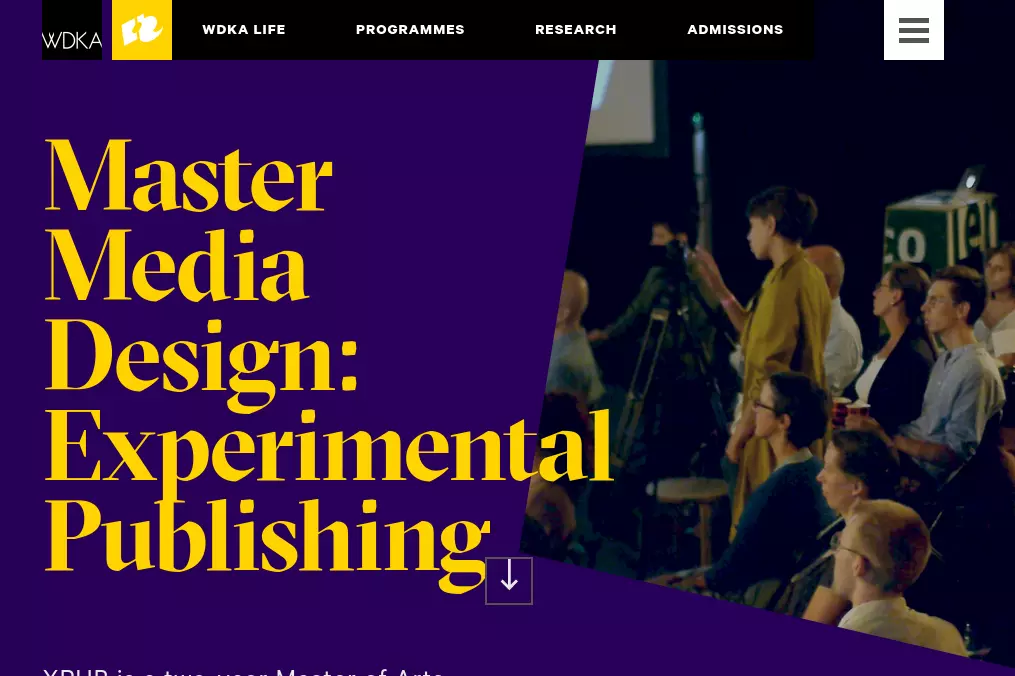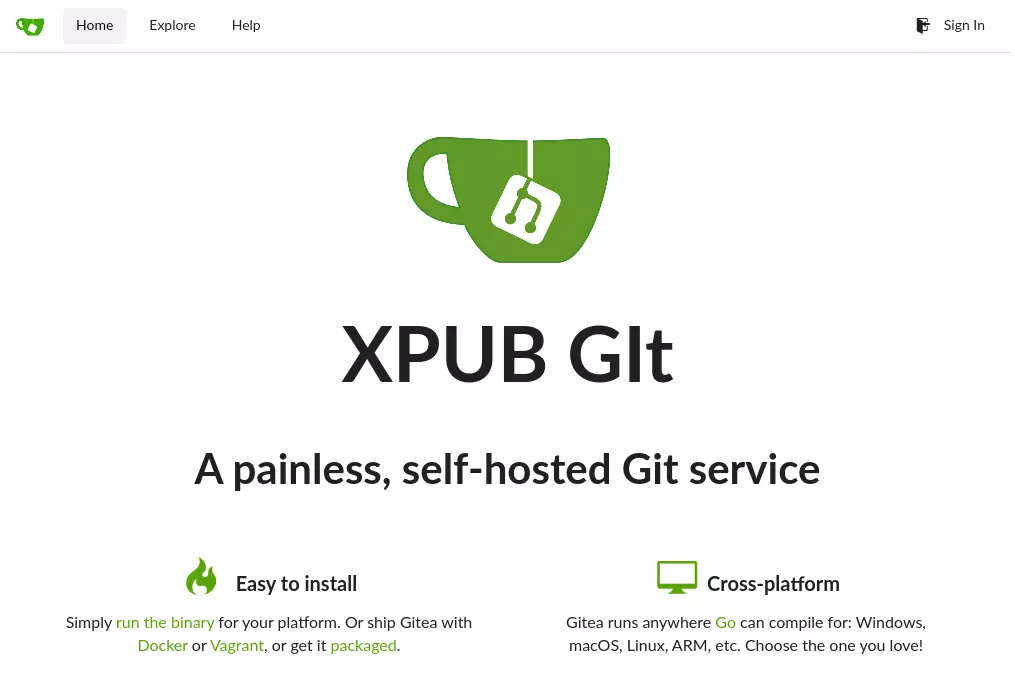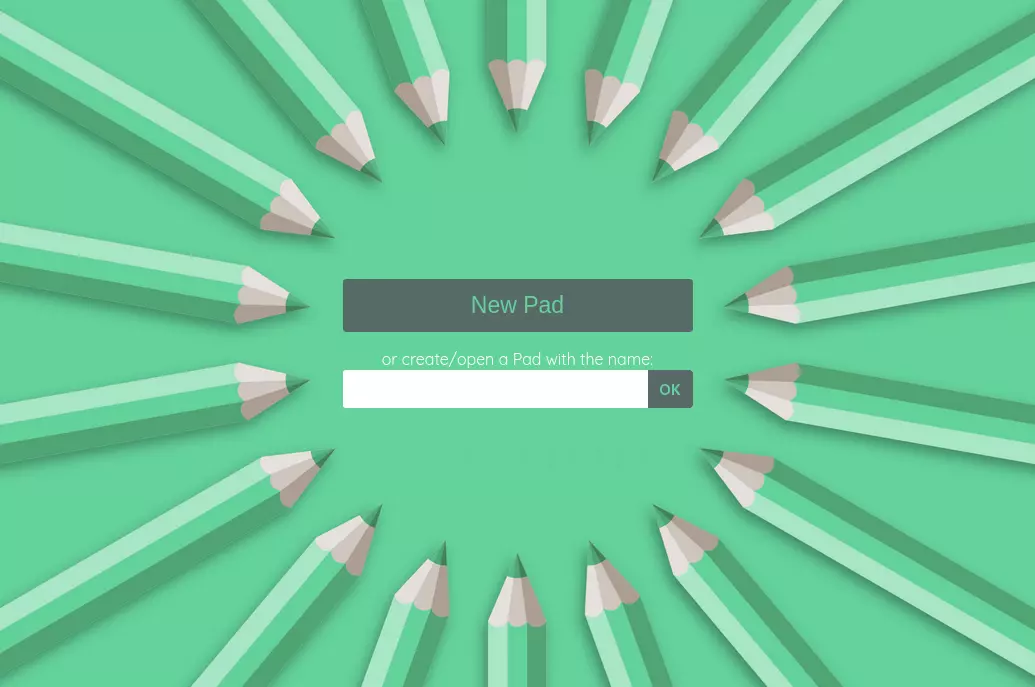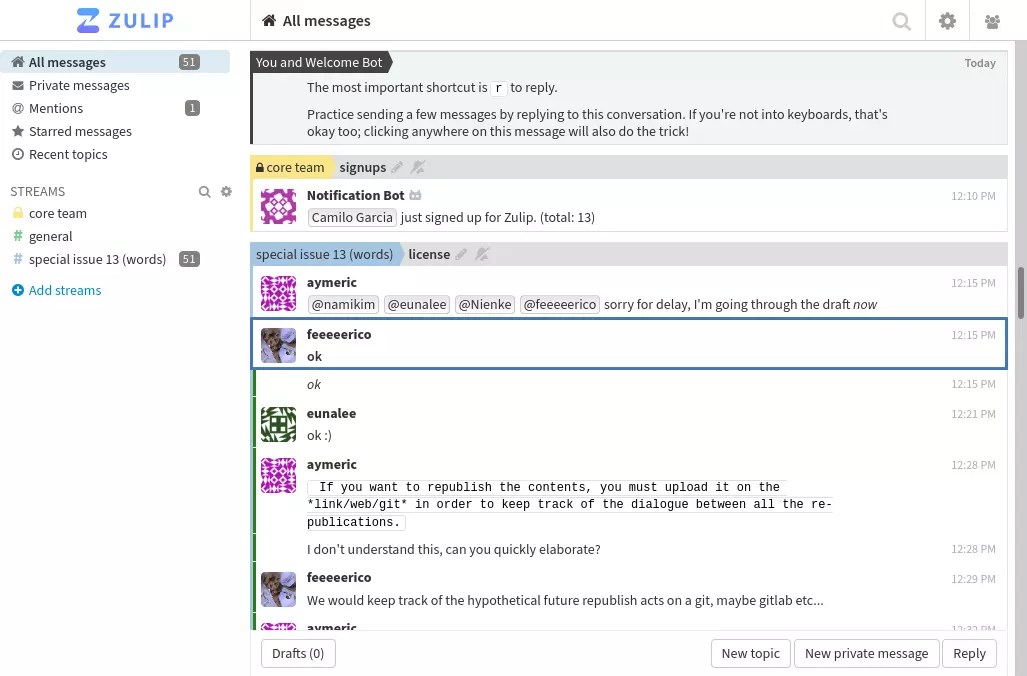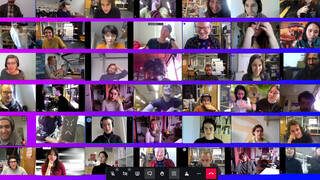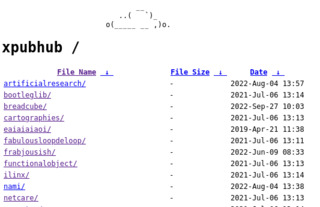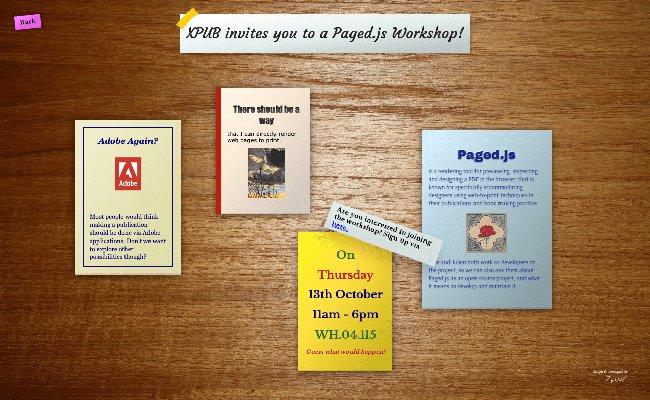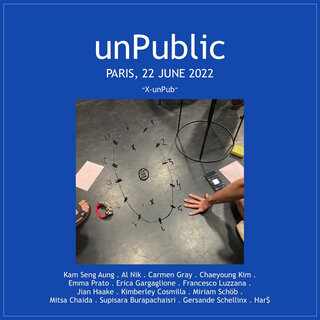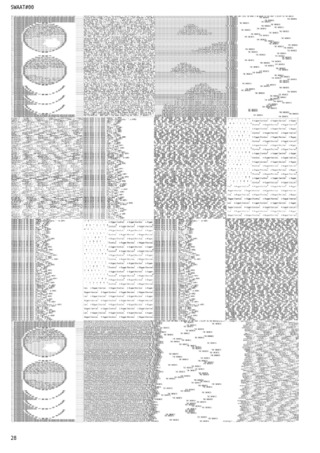8.4 KiB
| title |
|---|
| xpubliverse |
::: {.flex #intro}
XPUB is the Master of Arts in Fine Art and Design: Experimental Publishing of the Piet Zwart Institute. XPUB focuses on the acts of making things public and creating publics in the age of post-digital networks.
XPUB’s interests in publishing are therefore twofold: first, publishing as the inquiry and participation into the technological frameworks, political context and cultural processes through which things are made public; and second, how these are, or can be, used to create publics.
Welcome to the XPUB homepage with links to tools and webpages we use in the course.
An important part of the XPUB course is considering the implications of the technologies and tools we use, how the choices have an impact socially, environmentally, politically. In this spirit, rather than relying heavily on cloud services, XPUB (self-) hosts and maintains many of the servers and services that the course uses. Students learn and practice skills of programming and server maintenance in order to gain first hand experience with the materials of software and networks.:::
XPUB Call for application 2023
Applications deadlines: March 7, 2023 (non-EU) and May 10, 2023 (EU)
Online open day: February 11, 2023
public servers
::: {.flex}
Special Issues
[Special Issues](https://issue.xpub.nl) are multi-form publications related to a theme initated by a guest editor and produced collectively by XPUB first year students.Graduation projects and theses
[Graduation projects and theses](https://project.xpub.nl); representing the culmination of their two year Masters study, each XPUB student produces a graduation work and a thesis.Course wiki
[The wiki](https://pzwiki.wdka.nl/mediadesign/) is the lifeblood of the course: visit the [calendar](https://pzwiki.wdka.nl/mediadesign/Calendars:Networked_Media_Calendar) to get an idea of a typical week, or see the list of current [students](https://pzwiki.wdka.nl/mediadesign/Students) to see traces and sketches of work in progress. NB: The wiki is shared with the lens-based master, items specific to XPUB are indicated by *XPUB1* and *XPUB2* (to indicate the first and second years). The wiki is an example of a self-hosted instance of [mediawiki](https://mediawiki.org), the free software that underpins Wikipedia.Piet Zwart Institute
XPUB is one of six masters programs collectively known as the [Piet Zwart Institute](https://www.pzwart.nl/experimental-publishing/).Willem de Kooning Academy
XPUB is a part of the [Willem de Kooning](https://www.wdka.nl/programmes/master-media-design-experimental-publishing) academy, and can be found on the fourth floor of the Wijnhaven building, with convenient access to the many facilities of the Art academy.Gitea
XPUB self-hosts a [gitea code respository](https://git.xpub.nl). This provides a public outlet to support the many code works done within the course such as [this page](https://git.xpub.nl/XPUB/xpub.nl/src/branch/master/index.md).Etherpad
The [XPUB etherpad](https://pad.xpub.nl) is another crucial piece of course self-hosted infrastructure. Etherpads are all about realtime group collaboration with a minimum of prescriptive structures. Pads are used heavily in the course as a means of collective note taking, planning, [writing and annotation](https://pzwiki.wdka.nl/mediadesign/Methods_xpub).:::
servers for students & staff
::: {.flex}
Zulip
The [zulip](https://zulip.xpub.nl) instance functions as a private bulletin board system for the XPUB community.Mailing list
The course uses a mailing list provided by a neighboring network lurk.org.
Hotline (jitsi)
The [hotline](https://hotline.xpub.nl) is a self-hosted [jitsi](https://jitsi.org) instance.Hub
The [xpub hub](https://hub.xpub.nl/) is a public relay to a collection of self-hosted and student-maintained local servers. Using a combination of [VPN](https://tinc-vpn.org/) (virtual private network) and [reverse proxy](https://docs.nginx.com/nginx/admin-guide/web-server/reverse-proxy/), the hub enables experimentation with self-hosting, server portability, local-first and low power infrastructure and [convivial](http://damaged.bleu255.com/Convivial_Computing/) and [feminist](http://damaged.bleu255.com/Feminist_Technology/) server practices.:::
2022
::: {.flex}
Queerying Wikidata
XPUB, Anaïs Berck and queer artivist/wikimedian Z. Blace join forces to explore automatic writing experiments querying and queering Wikidata.Paged.js Workshop
Julie Blanc and Julien Taquet from the paged.js project share their experiences at the intersection of design practice and technical standards.Paged.js is a rendering tool for previewing, inspecting and designing a PDF in the browser, that is known for specifically accommodating designers using web-to-print techniques in their publications and book making practice. Julie and Julien both work (or have worked) as developers on the project, so the workshop gave students an opportunity to ask them about Paged.js as an open source project, and what it means to develop and maintain it. A nice example of paged.js in action is the 2022 graduation catalog.
X-unPub
[unPublic](https://unpublic.bandcamp.com/album/paris-22-june-2022?fbclid=IwAR0i1kkNAKDhjbYlqrWgB_Em58f0Q9PaPAbfhg0XiaZbguPMEafLhENfLuQ): XPUB2 presenting Special Issue #18 work in Paris:::
2021
::: {.flex}
SWAAT #00
[Software with an Attitude (SWAAT), Issue #00](https://media.xpub.nl/2021/SWAAT-00.pdf): Zine edited by Manetta Berends and Michael Murtaugh reflecting on the experiences of teaching programming and alternative tools in the context of the XPUB [Prototyping](https://pzwiki.wdka.nl/mediadesign/Prototyping) class.Screen Walk with Aymeric Mansoux and Roel Roscam-Abbing
[Screen Walk with Aymeric Mansoux and Roel Roscam-Abbing](https://thephotographersgallery.org.uk/whats-on/watch-screen-walk-aymeric-mansoux-and-roel-roscam-abbing): Online presentation by Aymeric Mansoux & Roel Roscam-Abbing including a description of XPUB as an example of making "systemic shifts" with alternative infrastructure.:::
colophon
This site is made with pandoc & markdown.
apply to the course
Applications deadlines: March 7, 2023 (non-EU) and May 10, 2023 (EU)
Online open day: February 11, 2023
